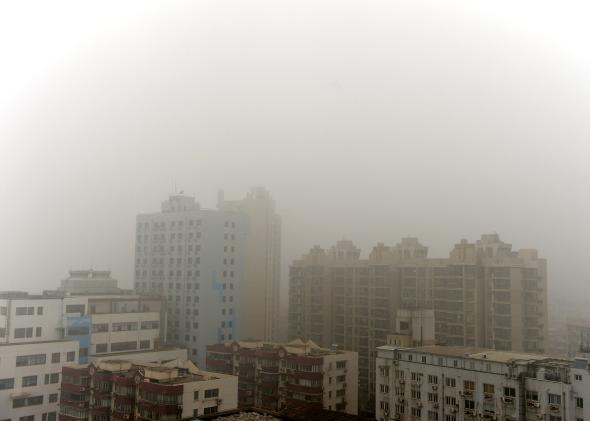People have been throwing out dire predictions about the possibility of World War III since the end of the second one. Movies come in trilogies, so why not wars, right?
Usually, people expect political turmoil, terrorist threats, and economic instability to fuel the next global conflict. But there’s a new nuclear warhead on the block: Climate change could be the catalyst that brings nations to the brink of warfare, according to policy specialists at the “Rescuing Climate Policy” panel held at the Global Institute of Sustainability at Arizona State University on Feb. 5. (Disclosure: Future Tense is a partnership of ASU, Slate, and the New America Foundation.)
Climate change-linked weather events like Superstorm Sandy, long-term droughts, and sea-level rise damage peoples’ quality of life and access to necessities like food and clean water. By proxy, they cause political unrest and economic distress.
“There will be a moment … when the global community will understand we need to take massive dramatic action on this whole thing,” said Carlo Jaeger, panel moderator and Swiss economist. “Unfortunately this is also a moment where there may be war.” Jaeger, who is the chairman of the European Climate Forum and a professor at Beijing Normal University, researches how financial markets affect climate change.
Countries need to accept climate change as reality and aggressively prepare to remove CO2 from the atmosphere, Jaeger said. But the focus needs to be on reducing carbon emissions and notat finger-pointing to other nations, he said. It seems like everyone’s mother taught them to own up to their mistakes, so why can’t lawmakers?
If the people in power don’t recognize that change isn’t always negative, the world could pay a high price—and we’re not talking about the price of oil.
Despite our patriotic impulses, the country coming out on top here is not the United States. It’s China. “Things are changing in China much more than we perceive in the West,” Jaeger said. For instance, China has become the world’s biggest investor in renewable energy.
Panelist Yongsheng Zhang, an economist and team lead for the Chinese government’s “Climate Change and Green Growth” research initiative, and his team team have found that an economy based on renewable energy is more productive than one dependent on oil and other fossil fuels, he said. “In international negotiations, the idea is to let other countries reduce emissions more and for your own country to reduce less. To reduce less is of national interest,” Zhang said. “This is a strategic misjudgment.”
China is by no means an environmental angel however. The country’s unprecedented economic growth in the past 30 years has come with high CO2 emissions, massive resource consumption, and environmental pollution. But Zhang believes policies that reduce carbon emissions could help their economy reach even greater heights.
Gary Dirks, former president of BP Asia-Pacific and BP China and director of ASU’s Global Institute of Sustainability, agrees. “This idea that green growth could move us into the realm of opportunity sharing is something that is timely,” he said. “The era of low-cost cheap oil is substantially over, and I don’t think there’s anybody any longer who would debate that’s the reality of it.”
It sounds like a slam-dunk case, but policymakers, and citizens, still need to wake up, the panelists said. It’s no great surprise that political gridlock and economic depression in countries outside of China will make it excruciatingly difficult to enact necessary policy change on a global scale. But it’s still discouraging to see steps backward when we need leaps forward. For instance, recently the European Union, long a dependable source of pro-environmental policy, has proposed an end to binding national targets for renewable energy sources by 2020 in an effort to curb rising energy costs.
“We’ve got the knowledge, we’ve got the technology, we’ve got the capital, and we’ve got the skills to do it,” said John Ashton, panelist and former climate change diplomat for the United Kingdom in 2006-2011. “We shouldn’t have to fight trench warfare inch by inch by inch to accomplish even a small part of it.”
Ashton’s penchant for World War I metaphors isn’t as symbolic as you might think. Evidence of wars caused at least in part by climate change has already cropped up.
“There was an article in [the New York Times] a couple weeks ago about the way in which the historic drought in Syria had destabilized the political settlement that the power of the Alawite regime was based on and created the conditions for the current turmoil we have in Syria,” Ashton said. “What it says sort of is: Coming to a cinema near you.” In rocky places, climate change could serve as a “threat multiplier,” as a 2013 Future Tense blog post put it.
The most daunting part of this reality is that global climate policy needs to shift for the better in the next 20-30 years. Today’s politicians don’t have to live with the consequences their actions will have on the climate, but the world’s population of young adults do.
So the question becomes, will the change happen before it’s too late?
